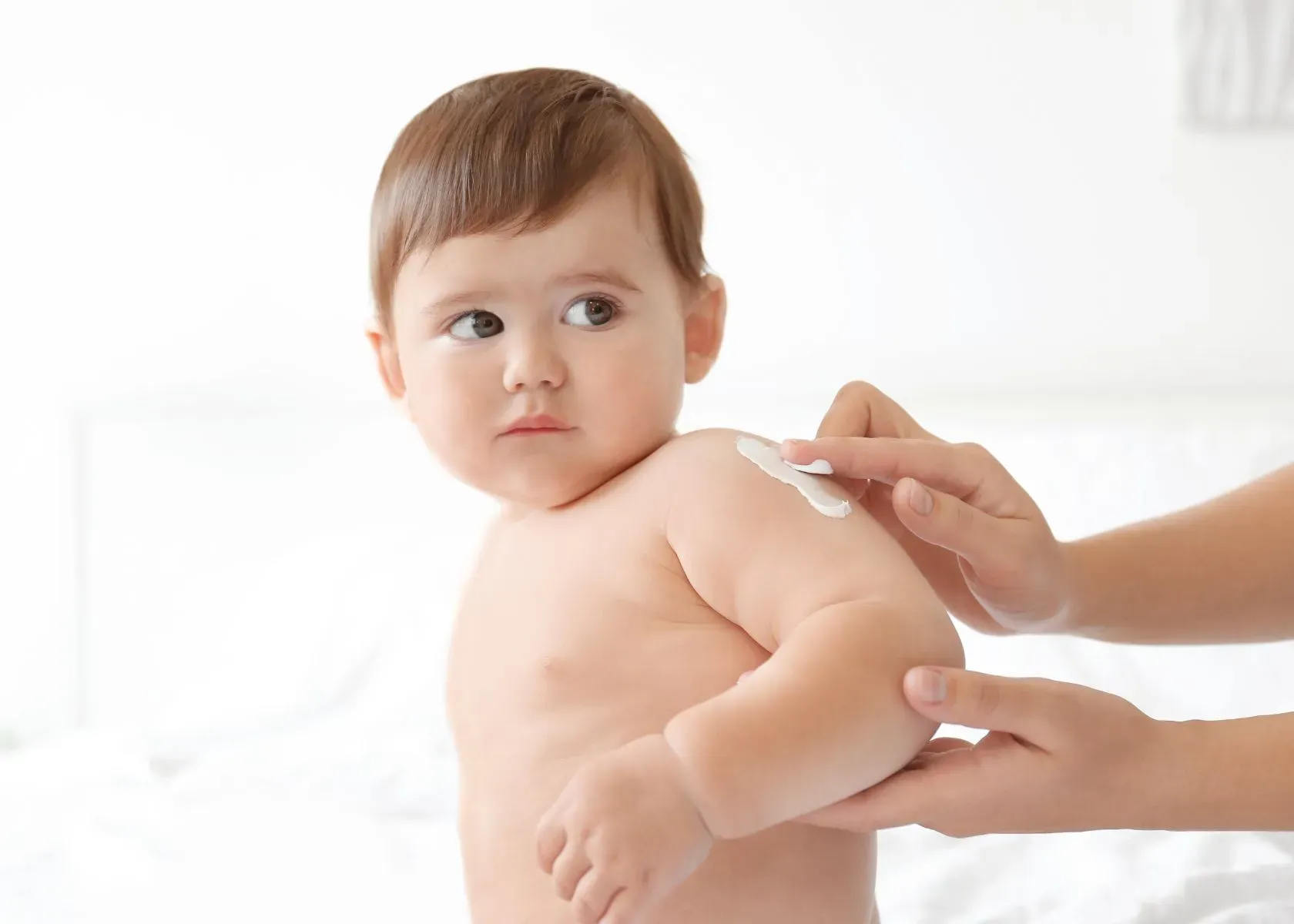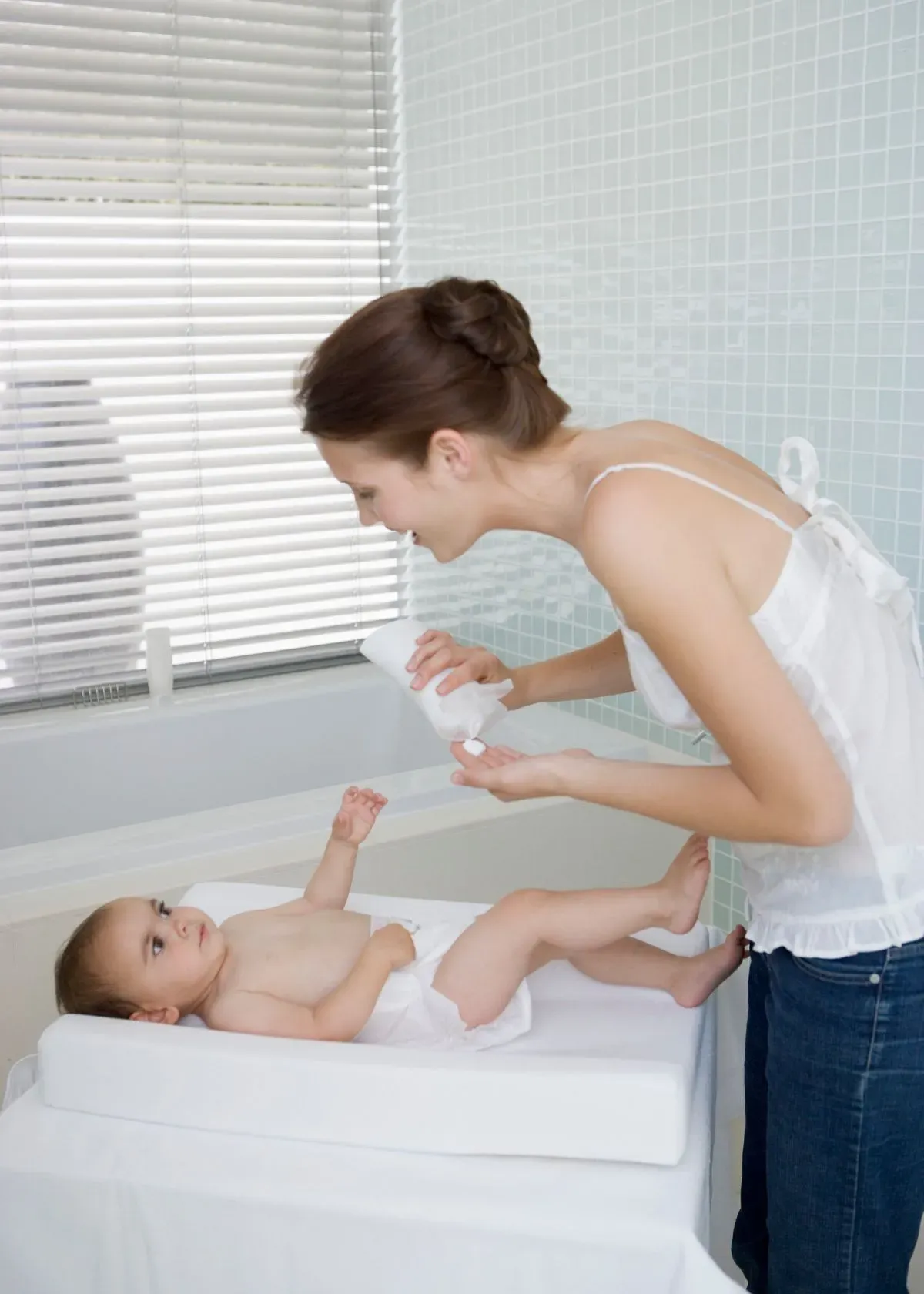Navigating the journey of parenthood comes with its share of puzzles, like figuring out the best ways to keep your baby’s skin soft and irritation-free. Dryness isn't just uncomfortable for babies—it can genuinely put a damper on their happy-go-lucky days.
So it's completely normal to find yourself pondering over baby lotions in the baby care aisle, questioning how often you should be reaching for that bottle.
I remember feeling swamped by options and advice when it came time to decide on skincare routines for my little one. However, by sifting carefully through pediatrician guidelines and dermatologist insights, I discovered that regular moisturizing is indeed key.
And here’s something you might not expect: some kiddos may benefit from a slathering of rich lotion twice daily if dry skin is an issue.
In this blog post, we’ll unravel the mystery behind baby skin care frequency together. We'll also arm you with pointers on selecting suitable products and throw in some extra tips for keeping your precious one’s skin healthy and comfortable.
Ready to turn those frets into confidence? Let's dive in.
- Observing your newborn's skin regularly and consulting with a pediatrician can help determine the right frequency for applying lotion to maintain their skin health and comfort.
- Factors such as climate, weather conditions, potential sensitivities or allergies, and changes in your baby's skin should be considered when deciding how often to apply lotion.
- For newborns (0 - 1 month), moisturizing as needed, typically after baths is recommended. As babies grow older, adjusting the frequency based on their specific needs and the sensitivity of their skin becomes pivotal.
How Often Should You Apply Lotion on a Baby?

I will provide tips for determining the frequency of applying lotion, recommend a frequency for different age groups, and emphasize the importance of avoiding over-moisturizing.
Recommended Frequency for Different Age Groups
Understanding your baby's moisturizing needs can be challenging, but knowing how often to apply lotion based on their age can help. Here's a summary of the recommended frequency for different age groups:
| Age Group | Recommended Frequency |
|---|---|
| Newborns (0-1 month) | Moisturize as needed, typically after baths |
| Infants (1-12 months) | Twice a day if skin is dry, especially after baths and diaper changes |
| Toddlers (1-3 years) | Continue as needed, paying attention to dry areas and times of weather changes |
| Preschool (3-5 years) | As needed, with routine after bath time and when skin feels dry |
Remember to choose products specially formulated for babies and to avoid over-moisturizing. Keeping your baby's skin healthy involves a balance between moisturizing and allowing their skin to breathe.
Tips for Determining Frequency
Determining how often to apply lotion to your baby's skin can depend on various factors, including the dryness of the skin. Here are some helpful tips for figuring out the right frequency:
- Observe your baby's skin regularly to gauge its moisture level.
- Consult with your paediatrician about the best moisturizing schedule for your baby.
- Consider the climate and weather conditions, as these can affect your baby's skin hydration needs.
- Keep an eye out for any changes in your baby's skin, as this may indicate a need for more or less frequent moisturizing.
- Factor in any potential sensitivities or allergies that could impact the choice and frequency of skincare products for your baby.
Avoid Over-Moisturizing
To keep your baby's skin healthy, it's important to use lotions as needed and not over-moisturize. Over-moisturizing can lead to clogged pores and irritation, so it's crucial to monitor the baby's skin condition closely.
If the skin feels adequately moisturized and supple, there may not be a need for additional lotion application. Newborns require very little lotion unless their skin is excessively dry; in such cases, it's best to consult with a healthcare provider for personalized recommendations.
It is essential to pay close attention to any signs of excessive moisture on your baby’s skin as this can result in discomfort or other issues. Always seek advice from your paediatrician if you have any concerns about how often you are applying lotion or believe that the baby may have an issue with their skincare routine.
Why Is Your Baby's Skin Dry?

Continuing from understanding the basics of baby skincare, it's essential to delve into the reasons behind your infant's dry and flaky skin. Babies have delicate skin that loses moisture more quickly than adult skin.
This can lead to dryness, especially in colder weather when indoor heaters are used or in hot climates where air conditioners dehydrate the air. When you're building a moisturizing baby skincare routine, consider that frequent baths can strip away natural oils from your baby's skin, contributing to dryness.
To keep their tiny bodies comfortable and their skin soft, use only mild baby soaps and cleansers designed for sensitive newborn skin during bath time. And remember not to bathe them too often; this will help maintain those precious natural oils.
After patting little one's skin gently with a towel post-bath – never rub as this could exacerbate dryness – applying ointment or lotion can provide relief and hydration to any areas of dry skin.
Choose products carefully though; pick ones that are fragrance-free and hypoallergenic because babies’ thin dermal layers absorb substances easily which means harsh chemicals should be avoided at all costs.
Other Ways to Care for Your Baby's Skin

You can also care for your baby's sensitive skin using the following ways:
- Bathing: Use mild, fragrance-free baby wash and limit baths to 10 minutes.
- Nappy area care: Change diapers frequently and use gentle wipes or a soft cloth with water.
- Sun protection: Keep your baby out of direct sunlight and dress them in lightweight, protective clothing.
Read on to learn more about caring for your baby's delicate skin.
Bathing
Bathing is essential for my baby's skincare routine. It helps to keep their skin clean and hydrated. Here are some important points to consider for bathing:
- Use a mild, fragrance-free baby shampoo or soap during bath time.
- Ensure the water temperature is warm, not hot, to prevent drying out the skin.
- Limit the bath time to 5-10 minutes to avoid over-drying the delicate skin.
- Gently pat their skin dry with a soft towel after the bath, rather than rubbing.
- Apply a gentle baby lotion or moisturizer after bathing to lock in moisture.
Nappy Area Care
After bathing, it's essential to pay attention to the nappy area. Proper care can help prevent diaper rash and keep your baby comfortable. Here are some important tips for taking care of your baby's nappy area:
- Keep the area clean by changing diapers frequently and gently cleaning with mild wipes or water.
- Let the skin fully dry before putting on a fresh diaper to avoid trapping moisture against the skin.
- Apply a thin layer of diaper cream to protect the skin from wetness and irritation.
- Avoid using products with harsh chemicals or fragrances that may irritate the sensitive skin in the nappy area. However, you can use a diaper rash cream or baby powder.
- Use breathable, absorbent diapers to help keep the nappy area dry and minimize the risk of rashes.
- If you notice any signs of redness or irritation, give your baby some diaper-free time to let their skin breathe.
Sun Protection
After taking care of your baby's nappy area, it's essential to ensure your baby's dry skin is also protected from the sun. Here are some important tips for keeping your baby safe from the sun's harmful rays:
- Use sunscreen specifically designed for babies with a high SPF (Sun Protection Factor) and broad-spectrum protection, applying it 30 minutes before going outdoors.
- Dress your baby in lightweight clothing that covers their arms and legs, along with a wide-brimmed hat to shield their face and neck.
- Seek shade during peak sunlight hours, typically between 10 AM and 4 PM.
- Keep your baby hydrated by offering plenty of fluids, especially when spending time outside.
- Avoid using sunscreen on babies under six months old; instead, keep them shaded or covered when outside.
- Be extra cautious near water, sand, and snow as these surfaces can reflect sunlight and increase UV exposure.
- Remember that even on cloudy days, UV rays can still harm your baby's skin, so follow sun protection practices consistently.
Frequently Asked Questions
As a new parent, I had a lot of questions about caring for my baby's delicate skin. When should I apply lotion? What kind is best? How often is too often? Understanding the answers has made a big difference in keeping my little one comfortable.
In this frequently asked questions guide, I'll share the insights I've gained after consulting pediatricians and researching best practices on moisturizing a baby's skin.
How often should I put lotion on my baby's skin?
You should moisturize your baby's skin with lotion after bath time and whenever their skin feels dry, to keep it soft and hydrated.
What kind of skincare products are safe for my newborn?
For newborn skincare, look for gentle, fragrance-free lotions specially formulated as infant skincare products to protect their delicate skin.
Can I prevent dry skin in infants by using lotion?
Yes, regular use of baby-friendly lotion can help prevent and treat newborn dry skin by maintaining proper hydration during daily baby skincare regimens.
Is it important to moisturize my baby after every bath?
It is beneficial to apply a mild baby lotion after each bath because bathing can strip moisture from an infant's sensitive skin, so moisturizing helps maintain the natural balance.
Should I adjust how much I use lotion based on changes in my baby’s skin?
Absolutely! If you notice that your infant has very dry skin or if there are changes in weather that may affect their skin hydration, increase the frequency of applying a gentle moisturizer as part of your overall baby skincare routine.
Conclusion
Moisturizing your baby's skin is essential for maintaining its health and softness. By applying lotion as needed, after baths, and diaper changes, you can effectively keep your baby's skin nourished.
This simple routine can lead to significant improvements in preventing dryness and maintaining healthy skin. For further guidance on baby skincare products or infant moisturizing schedules, consult a paediatrician for personalized recommendations.
Take proactive steps to care for your baby's delicate skin, ensuring comfort and protection from dryness or irritation. You can also share the tips that you use for your baby's skin care in the comments below.
References
- Telofski, L. S., Morello, A. P., Mack Correa, M. C., & Stamatas, G. N. (2012). The Infant Skin Barrier: Can We Preserve, Protect, and Enhance the Barrier? Dermatology Research and Practice, 2012.
- Blume-Peytavi, U., Cork, M. J., Faergemann, J., Szczapa, J., Vanaclocha, F., & Gelmetti, C. (2009). Bathing and cleansing in newborns from day 1 to first year of life: Recommendations from a European round table meeting. Journal of the European Academy of Dermatology and Venereology, 23(7), 751-759.
Read More About Baby Products





